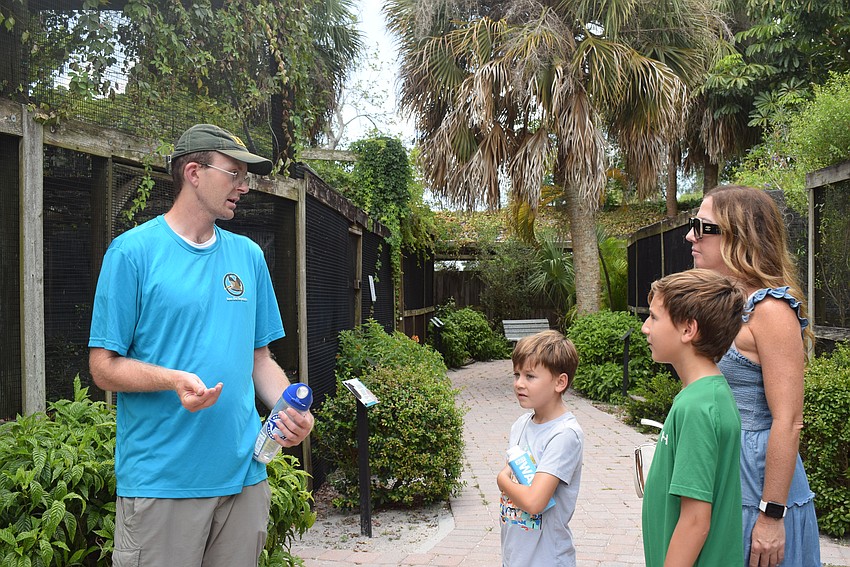- May 1, 2025
-
-
Loading

Loading

Save Our Seabirds wants to have a bigger footprint on environmental education, and Director of Outreach and Avian Care Sarah Rubin is looking to create those opportunities.
Starting in August, new educational programs for all ages will begin popping up at Save Our Seabirds, and Rubin said she hopes these lead to more opportunities down the road.
“I really would like for (the opportunities) to grow,” Rubin said. “We really would like for kids to be encouraged to come in.”
Rubin started at Save Our Seabirds about a year and a half ago. She said the campus didn’t have much of an education program before she started. With her background in environmental education, she began developing programs for school-aged children.
On Aug. 3, a night hike from 6:30 to 9 p.m. will kick off a week of back-to-school events. The night hike — which requires pre-registration for $20 — will be for ages 7 and up. Participants will be led on a hike of the nearby mangrove trail with night-vision goggles. After the hike, participants will observe some owls and night herons at Save Our Seabirds.
Kids can then learn what it’s like to be an owl biologist with a staged owl banding using plush owls. Banding is a method of tagging birds with small metal or plastic tags for identification.
“It’s actually really cute, the kids have to go into the nets and grab the owls, band them and measure them,” Rubin said.
Rubin is working on planning a week of free family activities for the week following the night hike and said those events will be posted on Save Our Seabirds’ social media.
Another event scheduled for that week is an owl pellet dissection. An owl pellet is the bird’s fecal matter, which can contain bones from other birds, rodents, snakes and crawfish. Owl pellets serve as a record of what the bird ate and can be used by scientists to learn more about the surrounding ecosystem, according to Cornell Lab.
That event is scheduled for at 10 a.m. on Aug. 6 for roughly an hour. Rubin said staff will also talk to participants about owl biology, then dissect the pellet using tools and match up the found bones. The cost is $5 per person.

Rubin also hopes to kick off an entirely new type of event for Save Our Seabirds — a vulture-themed party featuring Cupid the black vulture.
She’s still working on finalizing the details but, for a price to be determined, people can book a party window for two hours and utilize the outdoor space under the staff offices at the campus. At the party, participants will get vulture-themed crafts, a private mini tour and an appearance by Cupid the black vulture.
“That’s brand new, we’ve never had anything like that,” Rubin said about the vulture parties.
Cupid is one of Save Our Seabirds’ newer ambassador birds and imprinted on humans from an early age. Due to the imprint, Cupid is more used to humans than most of the other birds at Save Our Seabirds, according to Rubin.
On top of these new education programs, Rubin is working on increasing opportunities for local schools through a platform called EdExploreSRQ.
“For school programs, we’re introducing a lot of science-standard-based lessons,” Rubin said.
Through the EdExploreSRQ website, Rubin said teachers can now find curriculum-based field trips at Save Our Seabirds. Rubin can cater these programs to any age group to include STEM activities.
Field trips at Save Our Seabirds are limited to outdoor activities since the campus doesn’t yet have a large indoor space, but the schools would be given a tour followed by classes designed to meet the curriculum standards for the age group, according to Rubin.
Examples of activities could include building a nest to see if it can support the weight of real eggs and something Rubin called “adaptation artistry,” where students would work together to build their own birds and talk through the necessary adaptations included for the imagined species.
The field trips currently listed for Save Our Seabirds on EdExploreSRQ are $10 per student and adult, but one chaperone per 10 students is free. Rubin said Save Our Seabirds also offers discounts for Title 1 schools in the area that would want to utilize these programs.
For Rubin, the most valuable takeaway from the programs is when students and participants come back and say they are more interested in bird conservation or are more mindful of trash pollution because they now know how much it impacts birds.
“I love the way it changes a person’s outlook on animals and conservation,” Rubin said. “That’s what does it for me, that’s what makes it all worthwhile.”
For more information or to sign up for Save Our Seabirds' events, visit SaveOurSeabirds.org/events.